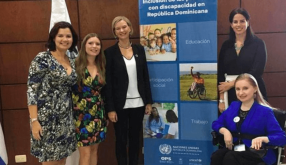At the United Nations Volunteers (UNV) programme, we work to pave a path towards a more inclusive UN system. Every year, we are deploying a growing number of UN Volunteers with disabilities around the globe. Between 2017 and 2020, the “Talent and Capacity Building Programme for an Inclusive UN System for Persons with Disabilities” was at the heart of our inclusion efforts. To make sure that we learn from this three-year project and ultimately boost inclusion in the United Nations system, we undertook a final evaluation in 2020.
Funded by the German Federal Ministry for Economic Cooperation and Development (BMZ), this project aimed at making the UN’s workforce more inclusive by deploying UN Volunteers with disabilities to the United Nations Development Programme (UNDP) and other UN partners.
Putting everyone’s wellbeing first
We commissioned the final project evaluation in March 2020. Setting out to identify barriers to disability inclusion within the UN system, we did not expect the evaluation itself would encounter an unprecedented obstacle: the start of the evaluation coincided with the onset of the COVID-19 crisis.
As per the Independent Evaluation Office’s guidance, we put a principle of ‘Do No Harm’ first and undertook an all-virtual evaluation process with remote data collection to protect the well-being of everyone involved.
Nothing about us without us
Going virtual did not mean going distant. An intensive planning was followed by a highly participatory data collection. UN Volunteers with disabilities, representatives of their host entities and UNV project managers were given the time and space needed to share their experiences.
The strength of this evaluation was in the commitment of everyone involved – and in the comprehensive planning conducted. A well-crafted evaluation design and a detailed evaluation matrix allowed for a step-by-step process leading to excellent results.
Stimulating learning – and action
We received an evaluation report that is concise, well written and easy-to-read. Not only has the evaluation confirmed the project’s achievements, but it has also set out highly relevant and actionable recommendations for future disability inclusion endeavors of UNV. The evaluation’s recommendations have stimulated learning in UNV and UNDP and, in the long run, will contribute to mainstreaming the engagement of UN Volunteers with disabilities.
UNV wishes to thank Gheorghe Caraseni for conducting this evaluation. As a programme administered by UNDP, UNV benefits from the guidance provided by the Independent Evaluation Office (IEO), which also published this blog.

